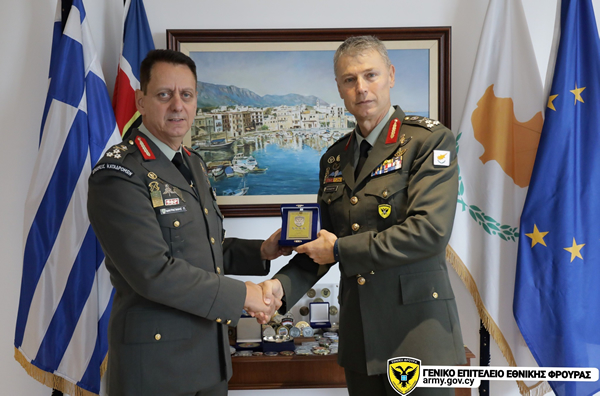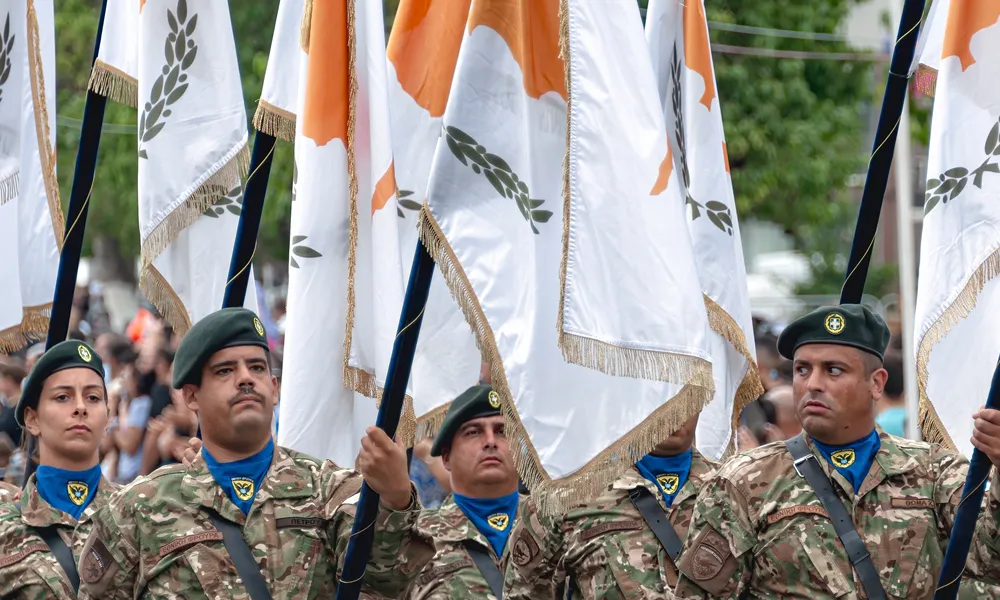The Republic of Cyprus is set to appoint a new Chief of the National Guard (NG) in the coming days who will be an active-duty officer from Greece, rather than a retired Greek officer, as has been the practice to date.
According to a well-placed source, “The decision of the Greek government is that the head of the National Guard will be appointed from among the active members of the Hellenic forces. He will not be retired.”
The chosen candidate will resign from the Hellenic Armed Forces to join the Cyprus National Guard, after which he will likely retire.
Since its founding in 1964, the National Guard has been led by retired officers from the Hellenic Armed Forces who would serve for two years with the option, usually taken, of another two years. Athens would send a shortlist of candidates, sometimes of one, and Nicosia would decide – in consultation with Athens. The deputy chief would be a Cypriot candidate selected by Nicosia.
Now, Athens has amended the practice, at least in terms of the pool of candidates, who will be active-duty officers, not retired. The selected candidate will leave the Hellenic Armed Forces and sign a contract with the Cyprus Republic to serve a two-year contract as Chief of the National Guard, but now without the potential for renewal.
Another shift in practice was adopted last year, regarding the Hellenic Forces of Cyprus (ELDYK), whereby the commander of the Greek contingent on the island now serves a maximum of three years with no option of renewal.
New appointment imminent
Greek Minister of National Defence Nikos Dendias is expected to send his Cypriot counterpart Vasilis Palmas a short list of four active-duty candidates for NG chief even today. The Cypriot minister will decide – in consultation with Dendias – and take the proposed candidate for cabinet approval, possibly on Wednesday morning.
Greek media outlets specialising on defence issues reported on Tuesday that the name most likely to go to cabinet on Wednesday will be that of Lieutenant General Emmanuel Theodorou.
The Cypriot defence ministry is already aware of the likely candidates and has done its due diligence, in preparation for a swift decision once Athens sends the final list.
According to sources, the likely candidates are:
- Lieutenant General Prokopios Mavraganis, Commanding General of the Special Warfare Command, and a former commander of ELDYK.
- Lieutenant General Stavros Papastathopoulos, Commanding General of the Hellenic First Army.
-
Lieutenant General Emmanuel Theodorou, Commander of the Supreme Military Command of the Interior and Islands
-
Lieutenant General Panayiotis Kapidopoulos

The sudden change in policy raises questions as to what this signifies both in terms of symbolism, and practice.
The current National Guard Chief Lieutenant General Georgios Tsitsikostas was hired two years ago by the Cyprus Republic. His contract was due to expire on September 8. Rather than renew for a further two years, the defence ministry decided on a one-month contract extension to ensure the smooth transition in leadership.
Shift in practice
According to sources, Nicosia is satisfied with Tsitsikostas’ term in office. His departure has more to do with the change in policy by Dendias. There are two potential reasons for this shift. One is that Athens wants to reduce the pressure brought on the government to nominate a candidate for the Cyprus job by recently or soon-to-be retired lieutenant generals in the Greek military. Despite the island’s ongoing division, the posting is considered favourable, both in terms of salary and conditions. The policy shift reduces the potential pool by half.
The other reason might be to send a message of improved functionality in the relationship between the two armed forces.
One could argue the relationship between Athens and Nicosia politically at least has been somewhat rocky lately. To the chagrin of President Nikos Christodoulides, Greek premier Kyriacos Mitsotakis the other day came out publicly calling on Cyprus to show its commitment to the planned Cyprus-Greece electricity interconnector by depositing €25 million owed to the project.
Perhaps this latest step will shift the dynamics somewhat. The Cyprus National Guard has already seen an improvement in the working relationship with other armed forces, particularly the USA, but also Israel. With plans afoot to upgrade the Paphos airbase and Mari naval base to welcome more military aircraft, large warships and submarines, relations are expected to enhance with military powers like France and others too.
It remains to be seen how the shifting dynamics and practices will play out and whether the latest development is simply an administrative act to reduce internal pressures or improve working relationships. But also, how it will be seen by others.
For a history of the National Guard, read the relevant chapter (in Greek) in the digital Cypriot encyclopaedia Polygnosi.
